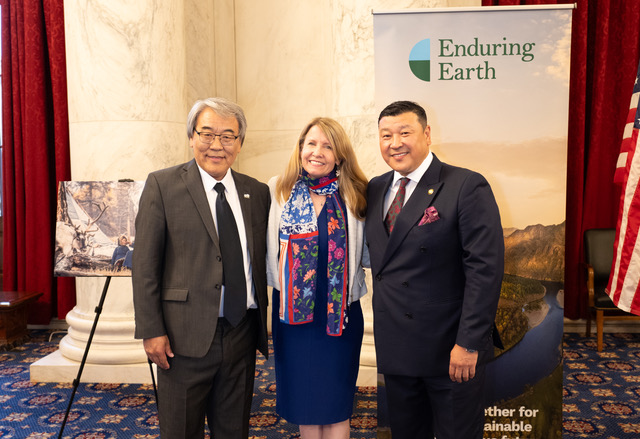Mongolia is embarking on a major conservation strategy. In a joint conservation effort, The Nature Conservancy (TNC) and the Mongolian government closed a $198 million Project Finance for Permanence (PFP) agreement. The agreement is a major step toward implementing Mongolia’s ambitious conservation and environmental protection goals in the next five, 10, and 15 years.
The “Eternal Mongolia” initiative was officially launched in April, with the financial backing of TNC, a U.S.-founded global environmental nonprofit organization. The PFP agreement allows Mongolia to be an active partner under TNC’s overarching “Enduring Earth” program, which is currently active in North, Central, and South America as well as sub-Saharan Africa. Mongolia’s participation enhanced TNC’s expansion into Asia; the only other PFP partner country in the region is Bhutan.
The $198 million PFP agreement will support the protection and conservation of Mongolia’s vulnerable lands, forests, waterbeds, and biodiversity. In combination, the “Eternal Mongolia” initiative aims to implement environmentally friendly policies collaboratively with government agencies, mining companies, businesses in different provinces, and local communities.
Marking this major milestone, the Mongolian and the TNC delegation gathered in Washington, D.C., from June 10 to 12 and met with the U.S. government environmental agencies as well as NGOs working to protect the environment and assist countries in reaching their biodiversity goals.
On June 10, the Embassy of Mongolia to the United States and TNC co-organized a celebration in the Kennedy Caucus Room with over 200 guests, including TNC stakeholders, government representatives, U.S. senators, conservation partners, and donor foundations.
Mongolian Ambassador to the U.S. Batbayar Ulziidelger, Country Director of TNC Mongolia Galbadrakh Davaa, Chief Executive Officer of TNC Jennifer Morris, and environmental worker Susan Antenen, a long-time Mongolia support, gave opening remarks, highlighting the deep commitments of this joint effort to conserve and protect Mongolia’s land sustainably.

From left: TNC Mongolia Country Director Galbadrakh Davaa, TNC Chief Executive Officer Jennifer Morris, and Mongolian Ambassador to the U.S. Batbayar Ulziidelger in Washington, D.C.
Photo courtesy of Embassy of Mongolia to the U.S.
Mongolia is proud of its vast landscape and abundance of natural resources. However, when these natural resources are exploited for economic purposes, coupled with decades of mismanagement, the land, its waterbeds, and the surrounding areas are greatly impacted. As part of Mongolia’s increasing efforts to find a solution to prevent overuse and conserve natural habitats and its ecosystem, collaboration and learning from other countries’ experiences are fundamental.
During a meeting with the World Wildlife Fund, Zdenka Piskulich, the managing director of “Enduring Earth” who successfully implemented the program in Costa Rica, gave a presentation on the mechanisms and the important steps for a country to adopt and implement the financial resources into a sustainable project.
Piskulich underscored several important components that are a prerequisite for countries to successfully adopt the PFP. In terms of Mongolia’s environmental management, these prerequisites and requirements present new learning curves, but the current and future Mongolian government is required to uphold these mechanisms under the new agreement.
One of the most important mechanisms she highlighted was the continuity of the projects – despite changes in leadership and government. For example, Brazilian ex-President Jair Bolsonaro’s mistakes cannot be repeated in Mongolia. Piskulich explained the “Five Pillars of Requirements” for a successful implementation of the PFP agreement, which involves a strong correlation and understanding between the ecological, social, political, organizational, and financial elements.
Moreover, considering the amount of financial resources, and longevity of those programs, anti-corruption measures need to be addressed.
Piskulich told The Diplomat that the PFP agreement embodies strong conflict-of-interest policies that Mongolia will need to uphold. She also emphasized that the majority of the cooperation work will need to be between TNC Mongolia and the government agencies and ministries. Enduring Earth will only act in an advisory and consulting capacity. Therefore, it is paramount for the Mongolian government to uphold the highest financial transparency for their Conservation Trust Fund.
Because environmental issues take a while to measure and have tangible, visible results, monitoring, and evaluation mechanisms are crucial. According to Piskulich, “One of the challenges we have faced is collaborating with centralized data systems. These are extremely difficult to retrieve important visual and measurable data.”
The country director of TNC Mongolia, lifelong conservationist Galbadrakh Davaa, emphasized the need and the requirement for good governance, and reliable, trustworthy ministries and agencies. He further stressed, “This is crucial for our partners, collaborators, donors, and investors that are interested and supporting environmentally-friendly businesses in Mongolia.”
In recent years, Mongolia’s environmental endeavors have been keeping pace with the accelerating trends toward tackling climate change and environmental issues. These topics are important not just for Mongolia’s environment but also will have a huge impact on the the pastoral community and mining businesses, and the ways in which these two different actors manage and take responsibility for environmental issues. Thus, sustainable financing, organized management, and improved know-how are crucial in the implementation process.
On June 11, the Mongolian and TNC delegation visited the U.S. State Department Interior’s Bureau of Land Management (BLM). During the meeting, the U.S. experts shared knowledge and experience-based research and implementation processes that will be crucial for the Mongolian government-TNC joint environmental management. Examples include forest rangers and management mechanisms for vegetation, public land use, and species management.
Moreover, James Brown from the BLM highlighted the delicate balance between working within the federal, state, and local jurisdictions in the U.S. system. He pointed out that all parties need to have a single goal, which is to protect, preserve, and have a balanced approach.
The meeting with BLM was crucial to the Mongolia delegation. Mongolian participants were especially interested in mechanisms that are currently implemented in North Dakota, Alaska, and Montana, U.S. states that are heavily involved in the mining and oil exploration sectors.
One of the founding members of TNC-Mongolia, Enkhtuya Oidov, currently advisor to the country director of TNC, told The Diplomat, “Since the beginning of the TNC-Mongolia, one of our goals was to incorporate science into policy, [and] learn from other countries’ mistakes so that we don’t repeat in Mongolia. The idea and the efforts are to adopt environmental protection programs and regulations jointly with the Mongolian government – with respect to different ministries and agencies.”
Another important issue for Mongolia’s environmental management is to establish a system that is suitable and sustainable for the country’s nomadic population and herders. Grazing and space allotment systems were important topics concerning land degradation and combating desertification.
In addition to tackling overgrazing, protecting waterways and biodiversity is equally important for Mongolia. With the TNC partnership, the incumbent government has an ambitious goal to protect and conserve 75 percent of freshwater resources, ecosystems, and other natural reserves by 2035. The implementation of such a major environmental agreement will come in different phases, with sustainable financing from the PFP agreement stretching over the next 15 years.
According to Enkhmunkh Otgontogtokh, the head of the Integrated Sectoral Policy of the Ministry of Economy and Development, the program “is a joint effort with TNC Mongolia’s Conservation Trust Fund, which allocates $71 million, established to administer donor funds committed to the PFP, and Mongolia’s Conservation Fund. And $126.8 million will be allocated from development and local funds.”
The collaboration between the Mongolian government and The Nature Conservancy is indeed a major stepping stone in the conservation and protection of Mongolia’s beautiful landscape and biodiversity. To connect all of the various moving parts, mutual understanding and deeper cooperation between government agencies, provincial administration, and local communities are paramount.

































